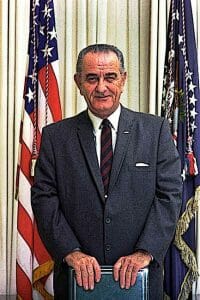Lyndon B. Johnson – 36
Lyndon B. Johnson served as the 36th President of the United States from 1963 to 1969. He became President upon the assassination of John F. Kennedy in 1963. After completing the first term, he was elected for a second term in 1964 and remained in office until 1969.
Life before becoming President
Lyndon B. Johnson was born in Texas. During his education, he taught at a school for some time. He then began his involvement in politics by becoming a congressional aide in 1931. He became a member of the House of Representatives in 1937 and later was elected to the U.S. Senate. It was in the U.S. Senate that Johnson attained significant power and prestige. He served as the Senate Minority Leader and the Senate Majority Leader.
Rise to Presidency
When John F. Kennedy ran for the office of the President, Johnson agreed to be his running mate. When Kennedy became President, Johnson served as the Vice President. Upon the assassination of President Kennedy, Johnson ascended to the office of the President in 1963. In 1964, he ran for a second term and received a huge share of the popular vote.
Life as President
President Johnson focused primarily on reforming the American society according to modern and liberal principles. To this end, he helped alleviate poverty in the society, introduce Medicare and Medicaid, and provide assistance for education.
He also actively opposed racial discrimination and prevented many southern states from enacting discriminatory laws. He also reformed the immigration system of the country, encouraging non-Europeans to immigrate to United States in greater numbers.
Important Events during President
Vietnam War remained a vital issue during the Johnson presidency. President Lyndon B. Johnson continued the policy of expanding American involvement in South Vietnam. However, this began to backfire as United States failed to achieve any notable military objectives in Vietnam. At the same time, domestic opposition to the war began to gain traction. This significantly contributed to the decline in Johnson’s popularity.
Johnson was an avid supporter of NASA and its space exploration programs. Despite the tragic failure of the Apollo 1 mission, Johnson stood behind the space agency and ultimately helped it complete a successful manned mission in the space.
The Johnson Treatment
President Lyndon B. Johnson was famous for dishing out the Johnson treatment to the people he wanted to persuade. He was nearly 6 feet and 3 inches tall. With such a stature, Johnson would start with mentioning past favors, promising more favors in the future, veiled threats if the other person wouldn’t agree and an overall vehement style of persuasion. In most cases, this style worked and it helped Johnson secure the passage of legislation through the U.S. Senate.
Decline in Popularity
Urban riots in black neighborhoods became a major problem during his presidency. In 1967, Detroit burned in these riots leaving 43 dead and above 2,000 injured. Then with the assassination of Martin Luther King in 1968, riots hit cities all over United States.
At the same time, anti-war activism grew with an increasingly greater opposition to the Vietnam War. These ultimately contributed to a rapid decline in Johnson’s popularity. He decided not to contest the next presidential elections and left office in 1969.
Learn about Lyndon B. Johnson the 36th President of America
- American Presidents List
- Abraham Lincoln -16
- Andrew Jackson – 7
- Barack Obama – 44
- Benjamin Harrison – 23
- Bill Clinton – 42nd
- Calvin Coolidge – 30
- Chester A. Arthur – 21
- Donald Trump – 45
- Dwight D. Eisenhower – 34
- Franklin D. Roosevelt – 32
- Franklin Pierce – 14
- George H. W. Bush – 41
- George W. Bush – 43
- George Washington – 1
- Gerald R. Ford Jr – 38
- Grover Cleveland – 22 & 24
- Harry S. Truman – 33
- Herbert Hoover – 31
- James A Garfield – 20
- James Buchanan – 15
- James K Polk – 11
- James Monroe – 5
- Jimmy E. Carter – 39
- Joe Biden – 46th (Current)
- John Adams – 2
- John F. Kennedy – 35
- John Quincy Adams – 6
- John Tyler – 10
- Lyndon B. Johnson – 36
- Martin Van Buren – 8
- Millard Fillmore – 13
- Richard M. Nixon – 37
- Ronald W. Reagan – 40
- Rutherford B. Hayes – 19
- Theodore Roosevelt – 26
- Thomas Jefferson – 3
- Warren G. Harding – 29
- William Henry Harrison – 9
- William McKinley – 25
- William Taft – 27
- Woodrow Wilson – 28
- Zachary Taylor – 12
- James Madison – 4
- Andrew Johnson – 17
